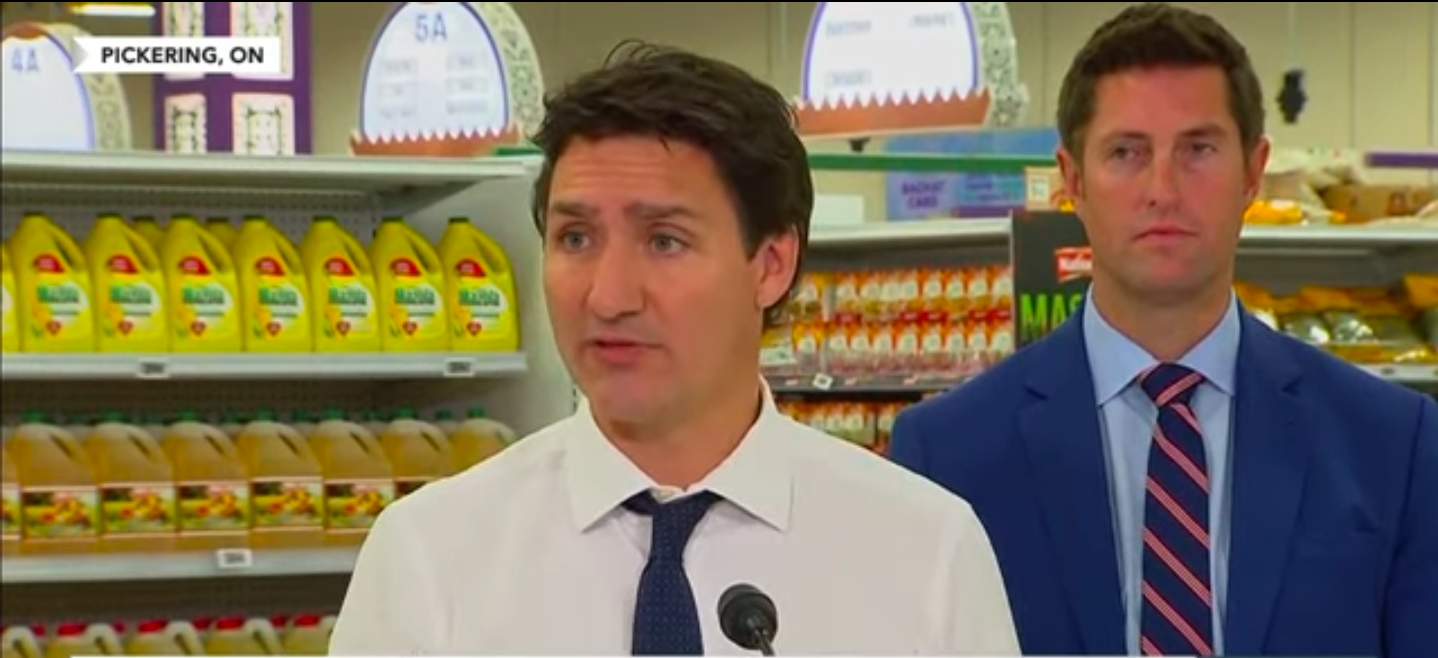PM Justin Trudeau announces affordability plan, aid for Ukraine in Pickering press conference
Published October 13, 2022 at 4:20 pm

Prime Minister Justin Trudeau made a stop in Pickering Wednesday morning to highlight his government’s affordability plan and new aid for Ukraine.
Pickering-Uxbridge MP Jennifer O’Connell welcomed Trudeau to her community and its Memon Supermarket, flanked by Liberal MPs Mark Holland and Ryan Turnbull, who represent Ajax and Whitby respectively.
This is O’Connell’s second time in the headlines in as many weeks after launching a broadside attack in Parliament against Conservative Leader Pierre Poilievre for courting misogynist “incel” voters on Youtube.
However, she was feeling much happier today, saying “It was a great thrill to be able to invite the Prime Minister here.” After O’Connell’s brief introduction, Trudeau took the podium.
Trudeau highlighted the $47 million in military aid to Ukraine announced earlier that day by Defense Minister Anita Anand. These new funds will buy artillery ammunition, winter clothes and drone cameras for the Ukrainian armed forces.
The new dollars come as Ukrainian defenders have seen great successes in battle in recent weeks. Russian forces had managed, after months of fighting to extend their claim over the border regions of Luhansk, Donetsk and Kharkiv. However, the Ukrainians launched a successful counter-offensive early last month, regaining control of large swaths of territory.
Since February Canada has sent $600 million in military aid to Ukraine to resist the Russian invasion. Additionally, Canadian troops are stationed in Great Britain and Poland to train Ukrainians and support fleeing citizens.
“Canada continues to stand up for human rights and the rule of law around the world alongside our allies,” Trudeau told the crowd in Pickering, “because we know that without it we risk squandering the decades of peace that led to the prosperity so many have benefitted from.”
Trudeau said increased aid was a “key topic” in a virtual meeting with the other leaders in the G7, the European Union, France, Germany, Italy, Japan, United Kingdom and United States held yesterday. The collation has pledged to standby Ukraine “for as long as it takes” to expel Russia.
The leaders discussed how as a world “we can continue to push back, not just in defense of Ukraine, not just in defense of the democratic principles that underpin all of our countries, but also in support for the millions upon millions of citizens around the world who are being impacted,” he said.
These impacts brought the Prime Minister to the ultimate reason for his visit, addressing the ongoing affordability crisis gripping Canada and much of the globe.
He said the “people of Pickering and the GTA are feeling the effects of Putin’s war firsthand,” laying some of the blame for the inflation crisis at the Russian President’s feet.
Canadian Inflation hit a pandemic-era peak in June 2022, reaching 8.1 per cent (a nearly 40-year high), before falling again over the last few months. While the Russo-Ukraine war is one factor driving inflation, the full reasons are myriad. Chief among them, per the Bank of Canada (BoC), is the COVID-19 pandemic.
The crisis began in 2020, with COVID-19 lockdowns driving a stall in the economy. The BoC injected “exceptional” amounts of money into the economy to stave of deflation and a recession.
However, the continual waves of openings and closing, bottlenecked shipping and increased consumer spending on solid goods drove up demand higher than supply could keep up, resulting in high inflation.
The Poilievre Opposition Conservatives have largely rejected the BoC’s findings, instead arguing inflation is a direct result of taxes and government spending they perceive are too high. Like Trudeau’s blaming of Putin, this is but a partial truth as nations around the world grapple with inflation regardless of monetary policy.
In his address in Pickering, Trudeau outlined his government’s plan to address the affordability crisis. They are doubling the GST sales tax credit for the next six months, sending up to $466 extra to families in the fall.
Additionally families with children under age 12, without dental care will receive $1,300 over the next two years for dental work. Low-income renters are also in for a bit of a boost with a one-time $500 “top-up” to the housing benefit. The measures are winding their way through parliament now.
Trudeau also noted the quarterly carbon tax rebate, an average of $186, will be sent out on Friday returning more than the average Canadian spends on the tax in that time to their pockets.
INdurham's Editorial Standards and Policies




